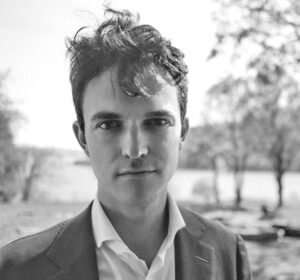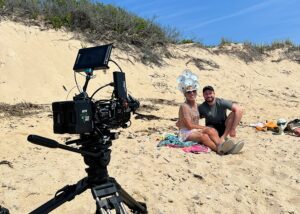PROVINCETOWN — Early this year, Ernest Martin was invited to show a sample of his unfinished work to fellow local filmmakers, most of whom he’d never met.

Queendom at the December meeting of the Outer Cape Filmmakers
Group. (Photo courtesy DOC NYC)
Martin was working on a documentary, The Boy Next Door, which relates the Provincetown community’s response to the AIDS crisis at the height of the epidemic in the 1980s and ’90s. And he was ready to talk with people who understood not only the craft but the town itself.
That one-hour meeting of the new Outer Cape Filmmakers Group at Waters Edge Cinema changed the course of Martin’s movie.
“They provided everything from useful creative feedback on how to more effectively tell the story to general support, guiding me to resources and encouraging me,” he says.
After the meeting, Fermin Rojas, who co-founded DKR films with his husband, Jay Kubesch, helped Martin gain access to the late Tim McCarthy’s archives. McCarthy was a prolific and talented Provincetown videographer and chronicler of gay history who contributed to David France’s 2012 documentary How to Survive a Plague. He died in 2018.
Martin says he spent 12 hours a day for two weeks reviewing and choosing footage from recordings McCarthy had made over decades.
The experience was profound, he says. “It felt kind of spiritual to be in that room,” says Martin. “I dove into the Provincetown of the ’90s in a way that I never dreamed possible.”
After two weeks of filming last summer, The Boy Next Door is in post-production with a planned June 2025 release.
The collaboration that made the final version possible is just what filmmaker Mike Syers and Anne Hubbell, executive director of the Provincetown Film Society, hoped would happen when they started working together a year ago to gather local talent into a more formal community. The society has since provided meeting space for the Outer Cape Filmmakers Group. Last June, three short films by members of the group were selected for the Provincetown International Film Festival.
In Provincetown, Syers says, “there was a group for artists, for painters and writers, but there was no group for filmmakers.” When you’re working on a film, he says, “You need to know that you’re not alone, that you’re part of this bigger creative community that is connected to this beautiful town.”
Syers got to know some other local filmmakers after his short film on former Provincetown town crier Ken Lonergan won an award at the 2018 festival. Getting their help and feedback made a big difference for his Urvashi Vaid: There Are Things to Do documentary that screened in June, he says, and he wanted others to experience that.

“Most films I’ve worked on have been me shooting and doing it all myself, but with this, there was such great dialogue and discussion,” Syers says. “It made me realize I should be tapping into this network more.”
In its first year, the fledgling group has attracted more than 60 members — directors, producers, camera operators, editors, and writers of documentaries, narratives, and short films — living on or connected to the Outer Cape.
After the early December meeting, Hubbell watched as filmmakers lingered in the cinema lobby. Some members are award winners, while others are planning their first films, she notes, but all were chatting animatedly — the type of interactions she says she’d hoped to see happen with this group.
In November, the group met at the PTV studios to learn and talk about the importance of community television and how local filmmakers can support it. While there will be no January meeting, future gatherings are expected to focus on social impact, film distribution, works in progress, and ways members can help each other.
The meetings are at 5:30 p.m. on the first Tuesday of each month, and in December, about 15 people were at the cinema, with one on Zoom. They watched a clip and trailer for Queendom and listened to Provincetown producer Igor Myakotin discuss his award-winning documentary.
Queendom, which screened here and at multiple other festivals worldwide, is about Gena Martin, a nonbinary performance artist from the same small town in Russia where Myakotin grew up and whose radical protests in striking costumes have endangered her freedom and her life.
Several filmmakers say they took away inspiration as well as solid information from Myakotin, who talked about how to get donations and grants and navigate the festival circuit.
“I always feel like an ensemble gives strength,” says Patrick Riviere, who’s in post-production with his second documentary, Artists at the Edge. Just hearing Myakotin talk was inspiring, he says.

Riviere has worked in the entertainment industry for decades, but as a filmmaking novice, he says he knew nothing about festivals when he made his first film, Just a Broadway Baby: Mary Ellen Ashley.
“The fact that somebody said, ‘I’m willing to help out’ makes me think a little bigger about my own filmmaking possibilities,” says Riviere. “This makes you think you can do it.”
Syers says members have also started getting together with each other one-on-one or in small groups. For his There Are Things to Do, Rojas signed on as producer, Kubesch helped with editing, Martin did camera work, and the cinema converted his film to the format needed for festival submission.
His movie is about the life and work of Vaid, the outspoken advocate for LGBTQ rights who died of cancer in 2022 at age 63; it chronicles her time in Provincetown and with partner Kate Clinton. Syers has recently been traveling to festivals around the country, speaking to student groups about activism and using the film for a national campaign.
“I know, personally, that I made a much better film than I could have on my own because I had input from other people,” Syers says. “That’s the power of this group and the power of collaboration.”



